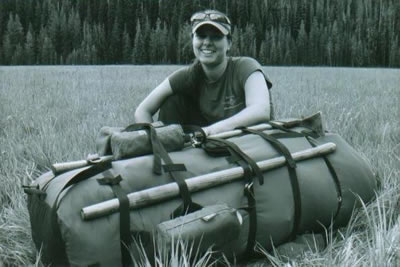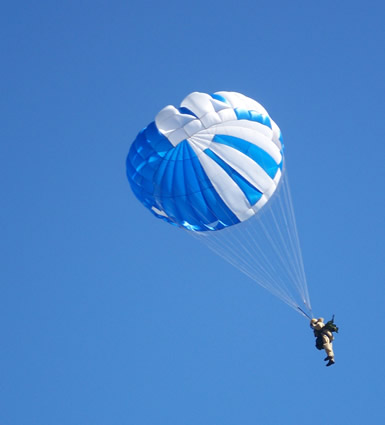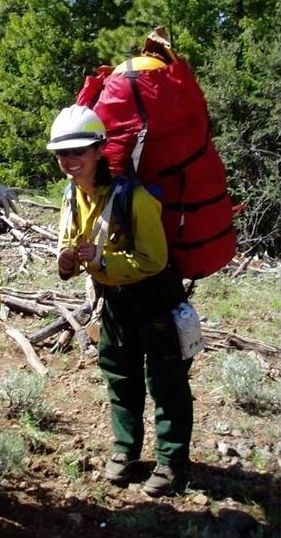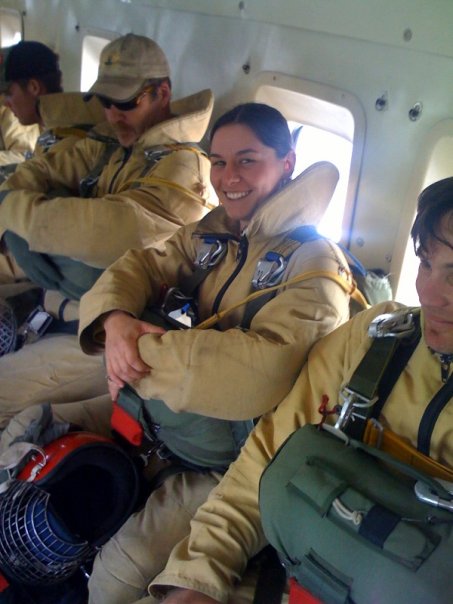As a former collegiate triathlete at the University of Nevada-Reno, McCall Smokejumper Ramona Atherton knows a thing or two about pushing her limits. Heading into her fifth season as a jumper, she is proof positive that if you want to make it as a wildland firefighter, it isn’t about brute strength or raw power. You just need the endurance of a camel and a heart just as big. With the tires on her bike still warm from a 55-mile training ride, she took a few minutes to talk with Hotshot Fitness about the adventurous life of a Forest Service smokejumper.
HF: What attracted you to a career as a smokejumper?
RA: Well, I grew up in the backcountry of Idaho, on a ranch close to the Frank Church River of No Return Wilderness area. There were forest fires there all the time, and these people would come in and do structure protection, so it was something that I grew up with. I have two older sisters and both of them fought fire. One of them, Aicha Hull, was a smokejumper also. She jumped out of Grangeville for three seasons and fought fire for ten years. They both showed me that it was a great way to go to school, make some money during the summer and support yourself.
HF: What are some of your favorite workouts?
RA: I do a lot of triathlon training. So I do road biking, running, swimming. I like mountain biking too – but I just don’t have one. Right now I’m training for the Boise Half-Ironman on June 12. I guess I do one race a year, and I really focus on it. [NOTE: Half-Ironman races consist of a 1.2 mile swim, a 56–mile bike ride, and a 13.1–mile run.]
HF: What crews were you on before you became a smokejumper?
RA: I came from the Logan Hotshot crew in northern Utah. Before that, I was on an engine on the Nez Perce for a season.
HF: How long were you on the Logan Hotshots for?
RA: Just two seasons. I was pretty green when I started jumping. I only had three seasons under my belt. Looking back on it, I think I was pretty lucky to get hired.
HF: Everyone talks about how brutal rookie training is – how long does it last for, what’s it like, and does it live up to its reputation?
RA: Um yeah, it definitely did live up to its reputation. I rookied in Redmond (Oregon)and there it’s about four weeks, though it depends on the weather more than anything, because you have to get 15 practice jumps in, and if you can’t get your 15 jumps, your rookie training might last 5 weeks, or 6 weeks even. But you hope that doesn’t happen. We started out with five people in my rookie class, and after the first day, there were only two of us left. That was pretty intense.
HF: So what are you doing during rookie training?
RA: Well, it’s primarily jump training. You do a little bit of the fire refresher, but other than that, it’s all how to jump out of an airplane safely. You PT twice a day. They run you in the morning, and they run you in the afternoon. And when I say they run you, they’re right there in your face the whole time. We’d do a lot of push-up runs also – they just try to break you down, essentially, and the trainers will even admit it. They’re not trying to make you a stronger person – they’re trying to see how far you can go. You go into rookie training in better shape than you come out because they just break you down so much. PT in the morning, PT in the afternoon and jump training in between. The first week is 100% physical. You learn a little bit about what you’re going to do, but they drill you on the procedure while you’re running. You do a 110 pound pack test, and then an 85 pound pack test on varied terrain.
HF: What are the pack tests like?
RA: The 110lb pack test is three miles on flat ground and you have an hour and a half to complete that. That’s where we lost one of our bros. The 85lb pack test is between 5 and 8 miles, depending on who made the route that year. It’s pretty steep up, down and around, and a little bit more representative of what you might be doing, although I’ve never had a packout that was as little as 85 pounds. And there’s no time limit on that one. You just have to finish.
HF: So your first jump – walk us through it. Was it terrifying? Exhilarating? Exciting?
RA: A little bit of everything. You spend the whole week before your first jump going through the simulations, which we call “The Units.” You practice your exits, your landings, and everything else so many times, that when you finally get up into the airplane, you’re really more focused on “Am I going to do this right?” Rather than, “Oh my God, I’m about to jump out of a plane.” You just don’t want to get yelled at anymore.
For your first jump, they put a radio in your pocket, and you turn it on before you jump. They talk you down, so you don’t have to worry too much about messing up your maneuvering. You want to focus on having a good exit, and a good landing, but for everything in between, there’s someone telling you “now turn right, now turn left” just to make sure you’re going to get down to a safe spot. They do that because some people do get up there and freak out, and they don’t know what to do. The actual exit out of plane was really exciting, your heart is pumping, but as soon as you get out into the air, it’s just so quiet, it was a nice break. After two weeks of people yelling at you, you finally get out there and it’s just you, all by yourself.
HF: Tell us about the first fire that you jumped.
RA: The first fire that I jumped was in the Mt. Hood Wilderness area in northern Oregon. It wasn’t a typical jumper fire, as there was a load of us from Redmond, and a full load from NCSB (North Cascade Smokejumper Base) so it was a really big group of people. There were about twenty of us out there for that fire. We went out there for five days, it was beautiful country, and the fire was about 30 acres. We had it contained the first or second day, but we had to make sure it was completely cold. It was an interesting experience, because as a rookie you’re given a few more duties than everyone else. You’re in charge of making sure the fires are lit before everyone else is up in the morning, and the water is boiling for them, and making sure there’s enough firewood. So I probably spent a lot more time stressing about keeping camp organized than anything else. Honestly, sometimes it feels like you’re not really even part of the firefighting effort, you’re more like camp cook and camp cleaner your first season. I hated that part about being a rookie.
 HF: What’s the biggest difference between hotshotting and smokejumping?
HF: What’s the biggest difference between hotshotting and smokejumping?
RA: There’s a lot more independence. When you’re a hotshot, you have the same role that you play every day as long as you’re there. Your tool is the Pulaski, and you’re in charge of the water. Then you get to be a jumper, and nobody is telling you what to do, there’s no tool order, and you’re expected to think for yourself.
On my first fire, when we got on the ground everyone scattered. I was like “where did everybody go?” You don’t want to do the wrong thing and make a fool out of yourself, but no one is barking orders. I had to take a second to think it through. “Ok, what’s going on? Where did everyone go? They went to the fire, of course, and they’re starting at the bottom, and they’re digging line around it.” There is an IC [Incident Commander] of course, but typically they don’t have to tell everyone what to do because everyone already knows. That really is the biggest thing.
HF: Wait, if someone wants to pickup a chainsaw, they pick up a chainsaw, if someone wants to pick up a pulaski, they pick up a pulaski, is it really that loose?
RA: It really is. Every base does it differently as far as the tools go, but typically each fire box has two pulaskis and sometimes a rhino and then they throw as many chainsaws as the IC asks for, usually one or two. There is usually someone that is really eager to run the saws and the rest just get you find in the box and go from there. As far as the saws go, usually the people who were sawyers on their shot crew want to run the saws. I wasn’t one, so I don’t really put up much of a fight if someone wants to run the chainsaw. It usually works out pretty well,
HF: What are you doing when you’re not on a fire?
RA: The biggest thing is we do all of our own maintenance on all gear, including our parachutes. After every jump, all the parachutes have to be inspected from top to bottom to make sure there aren’t any tears, or broken lines. If they are damaged, they get repaired, and then they get repacked, and all that takes a lot of time. We also make all of our own jumpsuits and line gear and packout bags, so we have our own sewing room in our loft where people are always doing a lot of projects. The thing about being a jumper is that you’re supposed to be on a 2 minute callback time, so we don’t do a lot of project work. Because if there’s a big lighting bust somewhere, we just can’t get back in time, so we stay on the base, we make our own stuff, and we make gear for some of the other firefighters in the area. Like the engines in the area, we make their line gear, and we’ll do a lot of the maintenance on their gear as well. Packing our fireboxes, and our food boxes, and washing our sleep bags, it takes a lot of time when you have 70 jumpers rotating in and out. When it’s slow, it definitely gets really tough to stay busy. The floors get really clean….
HF: What do you guys do to stay in shape in between fires?
RA: Just like everything else, it’s all on your own. We’ll organize group workouts, and sometimes all get together and go running on some trail, or we’ll all play ultimate Frisbee. We get an hour and a half every morning, and you can do whatever you want. You could stretch for an hour and a half if you wanted to if you feel like that would be best for you, or you could go out and do quarter mile intervals, nobody is checking up on you, you’re expected to workout. People are really starting to get into the whole cross fit thing at McCall. So they’ll be guys lifting and rolling these huge tractor tires around the yard.
HF: What do you like to do during your hour and a half of PT?
RA: I like to run. If it’s early in the season, I run in the morning, and then I stay after work and do some weight training because there’s just not enough time in the morning. Later on in the summer, when the weather gets nicer, I’ll run down to Payette Lake, which is about a mile, then go for a half hour swim, and then run back, that’s my favorite, but it takes a while for the lake to warm up. 
HF: Have you ever botched a landing and found yourself hung up in a tree?
RA: Just one time. My very first fire jump. I got it over with early. It was a pretty small tree. I was only twenty feet off the ground. And we’re all trained on how to do the let-down procedure. Part of rookie training is that you must be able to do that procedure in less than two minutes. In hindsight, it was probably the best time to do it – I was fresh out of training, and I had it down! If l landed in a tree now, well…it might take me a little bit longer. It was embarrassing, definitely, being my first fire jump and all, but my jump partner also landed in a tree on the same side of the jump spot, so I like to say that we got a big gust of wind! He was an old veteran, too.
It’s a big deal because it holds everything up until that person gets down out of the tree. They won’t drop cargo, they won’t do anything because they don’t know where that cargo is going to land. So the whole operation just stops until you get that person down out of the tree. It’s embarrassing for sure, and you get a lot of shit for it. Forever.
HF: After having spent 8 seasons in fire, you’ve probably seen a lot of unbelievably cool fire behavior?
RA: Yeah, for sure. On the shot crew, you’re doing burn-out operations, and that’s when you get to see the real cool fire behavior. But there’s been some intense behavior on fires as a jumper too. Once, we jumped on the Umatilla [National Forest in Oregon], a girl tore her knee on the landing, so we had to life-flight her out. The fire was in real thick timber, and by the time we got her out of there, it was pretty much a lost cause. We met up with some local engines that were dispatched as well, but we couldn’t really do much. We just hunkered down in our safety zone for the whole night and it just ripped. It was howling all around us all night long. By the next day, it was in the hundreds of thousands of acres. It was definitely the easiest fire I’ve ever been on: we jumped, we waited, and then they took us off.
HF: What sort of advice would you give to anyone interested in pursuing a career as a smokejumper?
RA: Start making contact with jump bases as soon as you know that it’s something you want to do. It’s super competitive, and it might take you a few years, but you just have to call and call and call. It’s just like any other fire job, but bases get so many applicants that if they don’t know who you are – they won’t hire you. Go there, interview, and once you get the job- be ready for anything. Workout twice a day if you can –you need to get used to do that. And definitely get used to being humble.
HF: What advice would you give to someone who’s been hired on as a rookie jumper, and is gearing up to train over the winter for their rookie season?
RA: Do a lot of push-up runs. Run a quarter mile, do 25 push-ups. Find someone who runs faster than you, and make yourself keep up with them, because that’s what’s gonna happen to you. And the minimums are really the minimums. And if that’s all you got – then you’re not ok. You might make it –but you’ll be pretty miserable. Definitely prepare for the packout. You might be a great runner, but once you put 110lbs on your back, it’s a totally different story. You’ll definitely want to try it a few times.
HF: Oh, one more thing we heard is that you’re about to graduate from college – congratulations!
RA: Thank you, I’m graduating with a dual degree in Spanish and Atmospheric Science.
HF: Are you thinking about staying in fire?
RA: I’m going to try. I’m going back this summer, and I’m starting graduate school in August at the University of Utah in meteorology. My advisor seems pretty open to the idea of me leaving for a few months every summer, so I’m going to hold out for as long as I can!
HF: It sounds like you love smokejumping Ramona, and we wish you the best of luck with everything. Thanks so much and have a safe season. We hope the Gods of overtime and hazard pay smile upon you!

